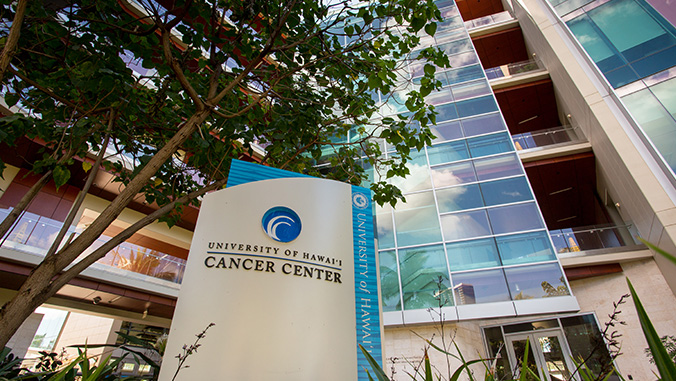
The $1.7-trillion federal government omnibus funding bill for fiscal year 2023 includes millions of dollars to help the University of Hawaiʻi serve the people of our islands thanks to the committed and effective support of Hawaiʻi’s congressional delegation—U.S. Senators Brian Schatz and Mazie Hirono and U.S. Representatives Ed Case and Kai Kahele.
Some of the funds appropriated specifically for UH programs include:
- $6.5 million for the UH Cancer Center for the construction of the new Early Phase Clinical Trial Research Center that will provide individuals with cancer access to Phase I clinical trials, which is currently only available in the continental U.S. Learn more
- $2.25 million to UH Mānoa, to establish the Shoreline Equity and Adaptation Hub to support the development of predictive sea-level rise models, economic and policy models for decision making, outreach and community engagement, and resilient landscape and community designs.
- $1 million to support planning and infrastructure for the UH Office of Indigenous Innovation to establish an Indigenous Data Science Hub with a living laboratory that could incubate up to 10 community-based innovation pilots in support of global resilience.
- $500,000 to the UH Sea Grant College Program to facilitate public planning and engagement to identify green and nature-based infrastructure approaches for resilience in the Waikīkī watershed.

One of the provisions that will directly benefit Hawaiʻi college students is the increase of $24.6 billion for federal student aid programs, which includes increasing the maximum Pell Grant award by $500 to $7,395 for the 2023–24 academic year.
Through the regular (non-earmark) process, the appropriations bill also funds a number of high-priority programs through which UH advances statewide and national interests, including:
- $30 million for U.S. Navy Alternative Energy Research, an increase of $2.5 million, which supports renewable energy activities at UH Mānoa through the Hawaiʻi Natural Energy Institute as well as sea-level rise research through the School of Ocean and Earth Science and Technology.
- $5 million for a new Center for Native Hawaiian, Pacific Islander and U.S.-Affiliated Pacific Islander (NHPIUSAPI) Health to focus on research, data collection and practice improvement to better serve NHPIUSAPI veterans, in partnership with UH.
- $9 million for the Resilient Innovative Sustainable Economies via University Partnerships program (RISE-UP Initiative), which supports UH, the University of Alaska, and the University of Rhode Island.
- $25 million for the Strengthening Alaska Native and Native Hawaiian-Serving Institutions Program, an increase of $3 million, that will support tutoring, mentorships, internships, faculty development and other activities to support Alaska Native and Native Hawaiian students at the collegiate level.
- $19 million for the Strengthening Asian American and Native American Pacific Islander-Serving Institutions Program, an increase of $8 million.
- $302 million, an increase for the High Performance Computing Modernization Program in the Department of Defense, which supports the UH-managed Maui High Performance Computing Center.
- $101 million for the National Domestic Preparedness Consortium, which includes the National Disaster Preparedness Training Center at UH Mānoa.
- $80 million for the Sea Grant Program, which supports coastal and Great Lakes communities through research, extension and education, including the UH Sea Grant College Program.
- $83 million for the U.S. Geological Survey’s Climate Adaptation Science Centers, which includes the Pacific Islands Climate Adaptation Science Center based out of UH Mānoa. These Centers provide regionally relevant scientific information, tools and techniques to resource managers and communities in Hawaiʻi in response to our changing climate.
- $38 million for the U.S. Geological Survey Volcano Hazards Program, which provides continuing support to the UH Hilo Center for the Study of Active Volcanoes.
- $2 million in new funding for Medical-Legal Partnerships, which provide value to underserved communities by combining health and legal services at a single site of care.
- $4 million to support unmanned vehicle research in partnership with the U.S. Navy.
- $2 million increase for the National Mesonet Program, with language encouraging expansion in non-contiguous areas.
- $9.5 billion for the National Science Foundation, an increase of $700 million. NSF support of UH research helped the university set a record in extramural funding last fiscal year.
- $470 million for Advanced Research Projects—Energy and High Energy Physics, which supports groundbreaking research at UH aimed at rapidly developing energy technologies to address the nation’s critical economic, environmental and energy security challenges.
The bill also instructs the U.S. Department of State to consider increasing the number of scholarships available for Pacific Islanders to study in the United States, many of whom study at UH.
“This appropriations bill will give our state funding to grow our local economy, improve roads and public transit, protect our environment, and strengthen housing, education, and health care programs,” said Schatz in a news release after the Senate passed the bipartisan bill.
“From protecting our environment, to strengthening our state’s emergency management capabilities, to supporting community health organizations and more, these projects will benefit people and communities across our state,” said Hirono in a news release.
“This funding measure continues to showcase a very productive partnership between our Hawaiʻi congressional delegation and UH, our flagship institution of higher education and engine of our economy, with its excellent record of attracting hundreds of millions in research funding,” said Case in a news release.
“We are thrilled with the amazing support we get from our congressional delegation individually and collectively in the federal appropriations process,” said UH President David Lassner. “It is truly an honor and a pleasure to work together to advance critical priorities for Hawaiʻi and our nation.”

